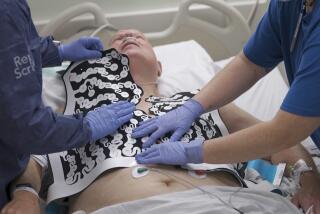Too long after heart attack, bone marrow cells lose effect: study
- Share via
Injections of bone marrow cells into the heart can help heart attack patients regain pumping function, studies have shown.
But such injections don’t seem to work once more than a week or so has passed post-heart attack, researchers working with a National Heart, Lung and Blood Institute-sponsored trial reported Monday in JAMA, the Journal of the American Medical Assn.
Physicians at five participating medical research centers treated 57 patients with infusions of cells from the subjects’ own bone marrow, two to three weeks after the patients had suffered a heart attack. Twenty-nine patients received a placebo treatment designed to look like a bone marrow infusion.
The researchers used magnetic resonance imaging to measure pumping function and wall motion in the heart’s left ventricle at baseline and six months after treatment. They also looked at the size of the patients’ heart attack scars. The upshot? The bone marrow treatments had little effect on patients. The scientists did not find significant differences between the subjects who got bone marrow treatment and the patients who got the placebo.
In some earlier studies in which patients received bone marrow within a week after their heart attacks, researchers observed improvement in heart function and a reduction in negative affects from the heart attack. Scientists believe such positive results may be a result of stem cells in the bone marrow helping to rebuild heart tissue directly. Another possible explanation is that bone marrow may contain factors that promote regrowth within the heart.
The LateTIME trial, as this study was called, hoped to see if delays in administering bone marrow cells to patients -- perhaps caused because cells aren’t available right away or because patients are too sick following a heart attack to undergo treatment -- would make a difference.
That delays did have a negative effect on the cells’ ability to improve heart function might seem to be a disappointment for clinicians and patients, wrote University of Miami stem cell researcher Dr. Joshua M. Hare, in an accompanying editorial. But knowing what timing doesn’t work will help physicians pinpoint an optimal time for treatment in the future, he added. “Definitive negative trials in a new area help to focus the design of future investigations, thereby ultimately advancing the field,” he wrote.
Dr. Joshua M. Hare’s editorial, also from JAMA, is accessible here.
Return to the Booster Shots blog.





